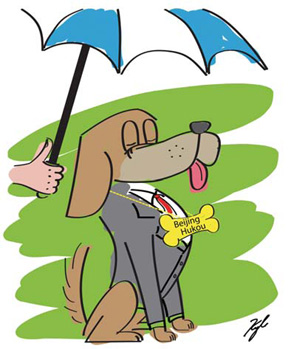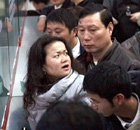Comment
Canine life in the capital
By Qi Zhai (China Daily)
Updated: 2009-12-18 09:51
 |
Large Medium Small |

When we moved to Beijing from the Northeast in 1986, there was no question of bringing the family dog, Feihu. Those days, it would've been so "country cousin" to take a domesticated canine to the big city.
Imagine an animal in a modern government-issued apartment block! Alternatively, the neighbors might've viewed it as unpatriotically lavish. Feeding an extra mouth when every other dutiful citizen lives three to a household?! Either way, a pet was simply not an option in the old capital.
Pity little Feihu only lived to be 14 and never saw the sweet life of a canine in the capital today. Recently, I picked up a stray puppy. Following a much needed bath, the next order of business was to get my Xiaoheigou ("little black dog" for a brownish pooch) registered as a Beijing "resident".
A friend talked me through the dog permit steps, dryly adding, "My little brother (born overseas) is still holding a rural hukou, but our dog is a bona fide urban dweller."
That was just the beginning. Little by little, I'm learning how much things have changed for pets in the city. Whereas Feihu was once considered lucky to have table scraps, my dog-owning friends were aghast when I naively suggested feeding Xiaohei the same. Under fire from their chastisement, I ran to the supermarket. Standing in front of shelves stacked with colorful bags of imported dog food, I couldn't make a move for fear of buying the wrong chow.
Is my street mutt a "small breed" or just a "puppy"? Would he prefer "chicken flavor" or "beef chunks"? At my mother's impatient prompting - "He's a dog. Any kind of kibble should do." - I decided on an economy-sized bag. It still cost me the equivalent of a modest restaurant meal for two.
As I went on daily walks with Xiaohei around the compound, my neighbors were quick to point out other doggy must-have's. "Who cuts his hair?" Nobody, I didn't think he needed a coiffeur. "A small dog needs a sweater for the winter." Thanks, Martha, I'll get my knitting needles out. "You shouldn't wash him with your shampoo; his fur will lose its shine." Noted, I'm on it.
All this clucking sent me guiltily back to the pet store, where I was in for more surprises. A bottle of doggy shampoo costs 80 yuan. That's four times what I pay for my Pantene. Canine clothing? Pull out a few hundred yuan. A shearling dog bed (I don't even think it's right to make one animal sleep on the fur of another!) will set you back a writing desk for your study.
Thinking of my mother's reproach were I to splurge on these bourgeois pet amenities, I decided Xiaohei could do without. But there are things I simply can't scrimp on. Take vaccines - rabies shots, 60 yuan, and basic check-up, 200 yuan. That's more than a visit to a human hospital would cost! The nurse looked at me pityingly, "But you only got the bare basics for your dog, dear."
Perhaps the money that Beijingers are willing to spend on their dogs is less telling than the deep emotion they've invested. The Dog Walking Brigade in my neighborhood forms catty cliques the way mothers band together at PTA meetings. These new capital canine owners talk about their dogs as if they were their one child.
On the issue of discipline: "My Maomao never runs wild with other dogs." On icky ailments: "How do you cure your Golden's heat rashes?" On playground fights: "Stay away from the Huskies in Building 10. Last week they sent a poodle in Building 6 to the hospital with their bites."

On bad parenting: "That one never picks up after his Corgi poops on the path." And, of course, there's occasional drama: "Better get your dog fixed before he causes trouble. Last year, a lady sued her neighbor after his dog got hers pregnant!"
From my little corner in Chaoyang, it certainly looks like the canines are keeping their owners on a tight leash in the capital!
qriouslife@gmail.com









